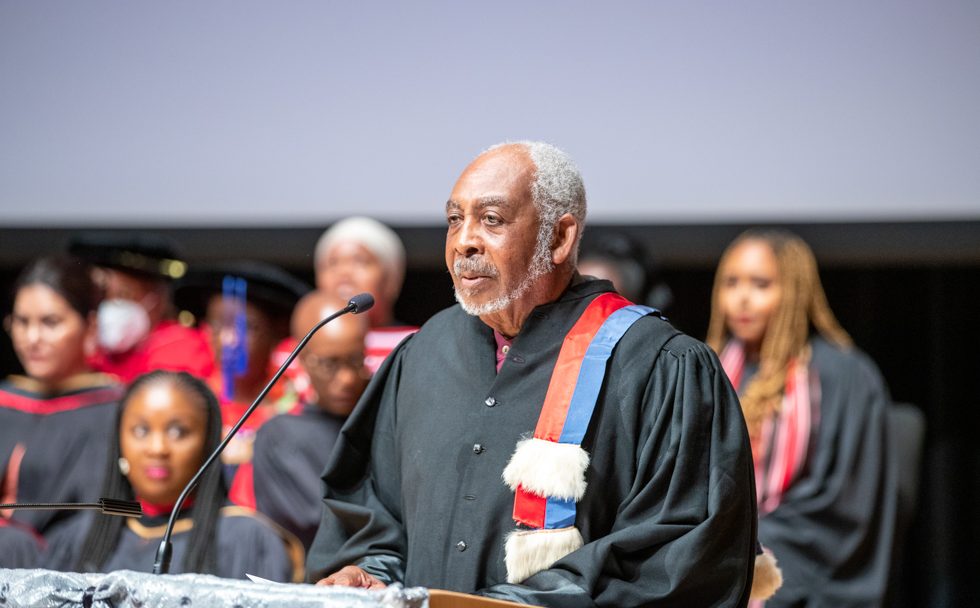African-Caribbean Faculty Association wins global award for tirelessly supporting Black excellence

An organization that has been the driving force behind many initiatives to foster potential and support Black scholars, students and staff at McMaster has been recognized with a prestigious international award.
ACFAM: Supporting Black excellence from McMaster University (OFFICIAL) on Vimeo.
“Even though I hadn’t officially accepted my offer yet, I already felt like I was part of McMaster. I was being welcomed into a community of excellent Black scholars and colleagues.”
— Keena Trowell, assistant professor, Faculty of Engineering
An organization that has been the driving force behind many initiatives to foster potential and support Black scholars, students and staff at McMaster has been recognized with a prestigious international award.
The African-Caribbean Faculty Association of McMaster, or ACFAM, received the 2023 U21 Award from Universitas 21, a global network of 28 world-leading, research-intensive universities, including McMaster, that focus on collaboration and internationalization.
Vice-Provost, International, and ACFAM co-founder Bonny Ibhawoh accepted the award last week at a U21 summit in Australia.
“This is really something to celebrate,” says Ibhawoh, who has been approached by global colleagues with questions about ACFAM.
“We are getting a lot of requests from other universities — not just in Canada, but around the world — asking, ‘How did you do this? And what can we learn from the McMaster experience?’ ”
THE SHOULDERS OF GIANTS
ACFAM was formed in 2010, when a few Black scholars at McMaster responded to a diverse student body’s concerns about the need to see themselves represented among faculty at the university.
But its history begins decades earlier, Ibhawoh stresses.
“We were building on the great work of a long tradition of pioneers — Black and racialized faculty at McMaster, who’d really set the foundation for the kind of work that we came to do — people like Dr. Fred Ofosu and Dr. Gary Warner.”
Warner, an active professor emeritus in the Faculty of Humanities, was the first — and for a long time, only — visible Black faculty member at the university. He is a renowned scholar and a lifelong community advocate who laid the foundations for much of ACFAM’s work.
“ACFAM was a way of coming together to support each other and to create a space that would allow us all to grow — individually and collectively — to see how we could better mentor students,” says Warner, adding that it’s vital for students to see themselves reflected in their educators.
Growing up in Trinidad and seeing fellow Trinidadians as judges and doctors and nurses, police officers, “I had models in front of me,” he says.
“I can see how someone who has not had that kind of experience needs to have role models visible as a beacon reminding them, ‘Yes, you can do whatever you choose. You can be whatever you choose.’”
A LONG LIST OF SUCCESSES
Over the years, ACFAM has led or played a key role in the creation of many initiatives and projects to ensure that Black faculty staff and students feel welcomed and included at McMaster, says co-founder Juliet Daniel, associate dean of research and external relations in the Faculty of Science.
It’s a long list: “We’ve hosted annual Black History Month events in coordination and consultation with our Black faculty staff and students, as well as with senior leaders at McMaster University,” Daniel begins.
“We implemented an African and Black Diaspora Studies interdisciplinary minor, which many of our students across campus have been privileged to participate in, taking diverse courses from all six of our faculties.”
ACFAM’s work picked up even more speed in the past three years, in the aftermath of George Floyd’s murder in the U.S., she says.
Newer initiatives include the Black Student Mentorship Program and the creation of the Black Student Success Centre, “which is to us the pinnacle of all of the students’ advocacy,” Daniel says.
“It’s a home and a place where all of our Black students can go to feel supported and to feel appreciated, and where we help them achieve their full potential by mentoring them, advising them, guiding them, giving them as much knowledge and support as they need and as we can offer.”
There is also the MACLeads program, an innovative student exchange program that provides young, emerging, underrepresented Canadian leaders with experiential learning opportunities with partner universities in Africa and the Caribbean.
“What makes this a really exciting initiative is that these are regions of the world where Canadian students typically do not seek out experiential learning opportunities,” says Ibhawoh.
“So, in some ways, ACFAM has opened new windows of opportunities for our students to engage with the world.”
A WAY TO THRIVE
Another highly successful initiative is the Black Scholar Cohort Hiring Initiative, which attracted applications from more than 450 exceptional Black scholars, “a source of wonder” for Warner, who says he has seen tremendous change and growth over the past five decades.
“We’re incredibly proud and happy to welcome these new Black scholars,” Daniel says. “We’re really thrilled to see them all thriving and excelling in every aspect of their research as well as their community engagement and involvement with our Black students.”
And to help new hires, ACFAM also has the Thrive program, which gives them an opportunity to meet with and learn from Black scholars at McMaster.
“One of the challenges of being a Black scholar is loneliness,” says Keena Trowell, an assistant professor who joined the Faculty of Engineering in July 2022.
“I think fundamentally, that’s what ACFAM helps combat. ACFAM is building community, it’s getting us all together so that we know whatever it is that we’re struggling with, any challenges that we’re facing, we’re not alone. There are others who may be going through it or have gone through it, and we can get the support that we need.
“And this is what really keeps us going.”
Warner hopes the growing ACFAM community will continue to find fellowship and space to grow here.
“People come with different strengths and different gifts. So, my hope would be that their particular gifts get to be drawn upon and get to really flourish in the McMaster environment,” he says.
“And then they in turn can be beacons and models for younger people.”
CommunityRelated News
News Listing

Bill developed and championed by HOPE Chair in Peace and Health Ingrid Waldron to become Canada’s first environmental justice law
Community, Research
July 30, 2024


